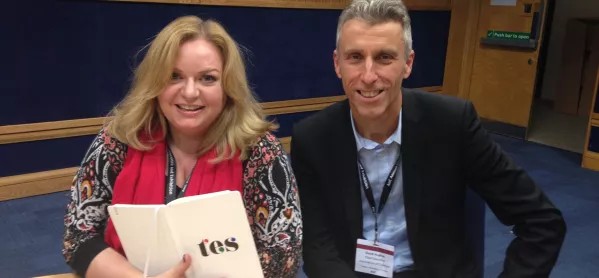- Home
- Behind the scenes at the AoC conference: part 2
Behind the scenes at the AoC conference: part 2

I had a rollercoaster mental health morning lurching from insightful sense to pseudo-scientific hogwash at this year’s Association of Colleges’ (AoC) annual conference. The more I learn about Baroness Susan “screen time gives you autism” Greenfield, the more perplexed I am that the AoC gave her a platform. Hmmmm.
Next stop was a panel discussion asking: “What’s the future of the FE workforce?” Shelagh Legrave, principal of Chichester College; David Russell, the chief executive of the Education and Training Foundation; and Andrew Harden, head of FE at the University and College Union, agreed that recruitment was a big issue, but making the profession an attractive prospect was perhaps a bigger one. Andrew urged the sector to have a grown-up conversation about increasing respect for the professionalism of practitioners, and the panel concurred that succession planning is a factor - a clear progression pathway from lecturer to principal is needed.
David suggested having a look at Meeting the Challenge of Change, the government White Paper from 1999, a highly successful teacher reform programme which altered the perception of school teachers.
‘The sector needs to puff out its chest’
When I talked to AoC chief executive David Hughes (pictured with myself, above) about FE’s attractiveness problems later on, he acknowledged that it’s a good example of where collective action is needed.
He said: “It’s really difficult to point people to somewhere to say, ‘Look at this, this is a profession, it’s a really good place to work.’” But the issue isn’t just an external perception problem, is it? It’s a confidence one.
David agreed. “Metaphorically, the sector needs to puff out its chest and say ‘We’re important, we’re a vital part of a post-Brexit world for young people and adults and if we’re not there 3 million people will lose out’. That means we should be confident about our own being.”
After workforce chat, it was on to “strategies for success in English and maths” led by Lindsey Johnson, vice principal at West Suffolk College, and Gill Worgan, principal of West Herts College. Both colleges are doing exceptionally well with English and maths, despite forced resits and consequential unrealistic expectations.
Gill stated the importance of using the “golden hour” first thing in the morning to contact absent students and get them into college. Lindsey then discussed the importance of buy-in from all staff, and suggested getting marketing teams on board. Apparently you can’t even sit on the lav at her college without solving a maths problem - there are posters everywhere!
I loved her college’s realistic planning for functional skills sessions (never at the beginning or end of the day) and the idea of bringing in students over half term for FS revision and resits: “Make it an event, a fiesta. Get Domino’s in.” Brilliant!
‘The professor with the treacle-thick accent’
So to the last session of the day, and I was resigned to dutifully tolerating the strategic leadership lecture. Costas Markides, professor of management at London Business School, wandered on stage and I took a deep breath, willing myself to stay awake throughout this no doubt LOL-free zone. Then he spoke…Within minutes I wondered if I should nip to the loo and write “I LOVE YOU” on my eyelids like Dr Indiana Jones’ student, but decided against it as I didn’t want to knacker my eyeliner.
The prof had a treacle-thick accent from his native Cyprus and spoke in a voice that spanned all the octaves. Some of his lecture was in a register so high that local dogs may now know more about disruptive change than is strictly necessary. His advice on how to make stuff happen from a strategic position was at once blindingly obvious and startlingly new. He usually dozes through meetings but switches to high alert when he hears the word “we”. (“We need to do this.”“We need to change that.”) It creates a sense of urgency but without the requisite agency to actually make the change. People hide behind “we”, when what they actually mean is “you”. When you hear this in a meeting, ask who this elusive “we” is. Clarity is key.
The same can be said for creativity in business: “I’m happy to think outside the box but first of all where the hell is the box? SHOW ME THE BOX!” Often resistance to change is just a lack of clarity. If you get an opportunity to see Prof Markides in action, grasp it, but make sure you write on your eyelids first. It’ll save time.
And that was my day. I couldn’t stay for the big evening do, as experience tells me I’d still be talking nonsense in a bar at 4am, and I had classes to teach the next morning. So thank you, AoC. Until we meet again…
FE SPECIAL OFFER: click here to try out a TES Further Education subscription for just £1 for 4 weeks.
Want to keep up with the latest education news and opinion? Follow TES FE News on Twitter, like us on Facebook and follow us on LinkedIn
Keep reading for just £1 per month
You've reached your limit of free articles this month. Subscribe for £1 per month for three months and get:
- Unlimited access to all Tes magazine content
- Exclusive subscriber-only stories
- Award-winning email newsletters



